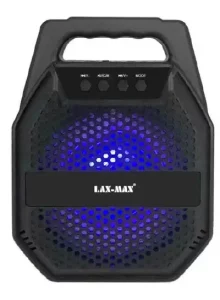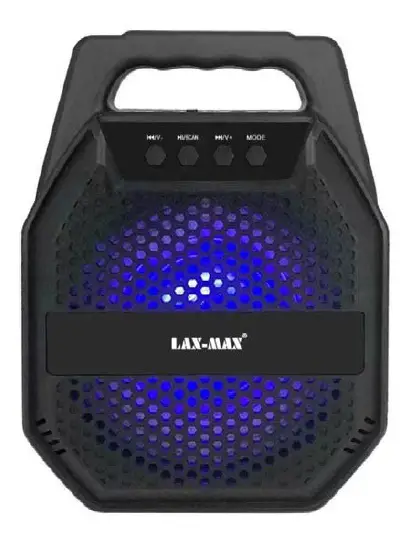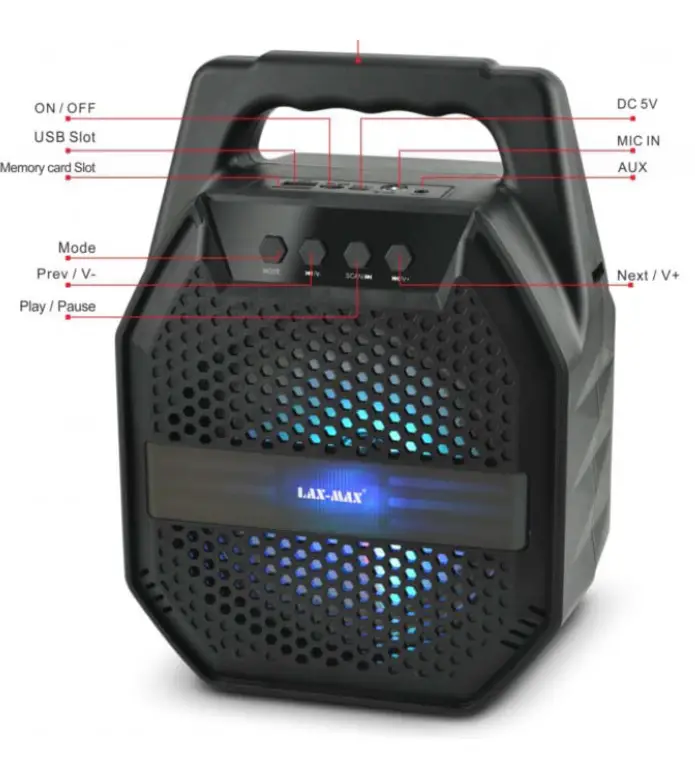

LAX-MAX LK065 Portable Speaker
SPEAKER MANUAL
PORTABLE SPEAKER
MODEL NO.: LK065

Features:
- Bluetooth connection
- TWS Function
- Support USB/Micro SD Playback
- FM Radio
- Karaoke Function
- AUX Input
Control Panel

- USB Slot: Insert USB Drive to listen to stored tracks
- TF Card Slot: Insert TF card to listen to stored tracks
- Power ON/OFF: Turn ON/OFF Unit’s power supply
- DC 5V IN: Use included charging cable to charge unit. (Adaptor not included)
- MIC input: Connection for a microphone(included) with a ¼ inch (6.3mm) plug
- AUX input: Connect external media player using 3.5mm line-in cable
- Mode: Toggle between source Bluetooth/USB/Micro SD/AUX/FM Radio. Press and hold to turn ON/OFF the woofer light
- Previous Track/V‐: Select a previous track in Bluetooth/USB/Micro SD card Modes, Select previous preset frequency in FM mode. Press and hold to decrease volume
- Play/Pause/SCAN/TWS: Play or Pause in Bluetooth/USB/Micro SD card Mode. When in FM mode, press and hold to scan for available frequencies. When in Bluetooth mode, press and hold this button will be in TWS mode
- Next Track/V+: Select next track in Bluetooth/USB/Micro SD card Modes. Select next preset frequency in FM mode. Press and hold to increase the volume
Paring A Bluetooth Device
Use Bluetooth mode to stream music from a Bluetooth enabled player (e.g., smartphone, or tablet device). A device must be paired with the unit before using them together for the first time.
- Make sure Bluetooth is enabled on your device and that it’s next to the unit before attempting to pair it.
- Turn on the unit and set it to Bluetooth mode (press the mode button if required to Bluetooth status). The unit will automatically enter into Bluetooth pairing mode.
- Use your device to search for nearby Bluetooth devices. Our speaker pairing name – LK065
- Select “LK065” from the list of found/available devices.
TWS function:
- Switch “POWER ON” on both 2 sets of same model speaker
- Choose 1 unit as your master speaker
- Press and hold the PLAY/PAUSE button on master unit
- Both units will wirelessly connect with each other after you hear a BEEP sound.
- Please note TWS function only works on Bluetooth mode.
- Pair your Bluetooth: use your device to search for nearby Bluetooth devices. The pairing name is “LK065”
- Select “LK065”from the list of found/available devices
- To Disconnect for TWS mode, press and hold the PLAY/PAUSE button on the secondary unit
- Your Bluetooth device will be connected to the master speaker only
- To reconnect TWS mode, Switch ON secondary unit, and long-press the PLAY/PAUSE on the master speaker and both units will connect again
- Trouble Shooting: If you have any trouble in connecting in TWS mode, suggest switch OFF both units and restart in pairing from point
FCC Statement
Changes or modifications not expressly approved by the party responsible for compliance could void the user’s authority to operate the equipment.
This equipment has been tested and found to comply with the limits for a Class B digital device, pursuant to Part 15 of the FCC Rules. These limits are designed to provide reasonable protection against harmful interference in a residential installation. This equipment generates uses and can radiate radio frequency energy and, if not installed and used in accordance with the instructions, may cause harmful interference to radio communications. However, there is no guarantee that interference will not occur in a particular installation. If this equipment does cause harmful interference to radio or television reception, which can be determined by turning the equipment off and on, the user is encouraged to try to correct the interference by one or more of the following measures:
- Reorient or relocate the receiving antenna.
- Increase the separation between the equipment and receiver.
- Connect the equipment into an outlet on a circuit different from that to which the receiver is connected.
- Consult the dealer or an experienced radio/TV technician for help
This device complies with part 15 of the FCC rules. Operation is subject to the following two conditions (1)this device may not cause harmful interference, and (2) this device must accept any interference received, including interference that may cause undesired operation.